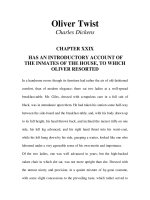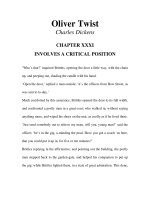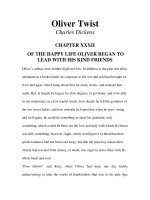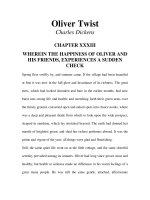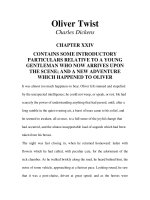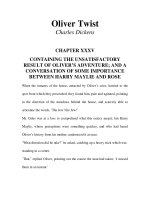Tài liệu LUYỆN ĐỌC TIẾNG ANH QUA TÁC PHẨM VĂN HỌC-JANE EYRE CHARLOTTE BRONTE Chapter 24 ppt
Bạn đang xem bản rút gọn của tài liệu. Xem và tải ngay bản đầy đủ của tài liệu tại đây (35.06 KB, 15 trang )
JANE EYRE
CHARLOTTE BRONTE
Chapter 24
As I rose and dressed, I thought over what had happened, and wondered if it
were a dream. I could not be certain of the reality till I had seen Mr.
Rochester again, and heard him renew his words of love and promise.
While arranging my hair, I looked at my face in the glass, and felt it was no
longer plain: there was hope in its aspect and life in its colour; and my eyes
seemed as if they had beheld the fount of fruition, and borrowed beams from
the lustrous ripple. I had often been unwilling to look at my master, because
I feared he could not be pleased at my look; but I was sure I might lift my
face to his now, and not cool his affection by its expression. I took a plain
but clean and light summer dress from my drawer and put it on: it seemed no
attire had ever so well become me, because none had I ever worn in so
blissful a mood.
I was not surprised, when I ran down into the hall, to see that a brilliant June
morning had succeeded to the tempest of the night; and to feel, through the
open glass door, the breathing of a fresh and fragrant breeze. Nature must be
gladsome when I was so happy. A beggar-woman and her little boy pale,
ragged objects both were coming up the walk, and I ran down and gave
them all the money I happened to have in my purse some three or four
shillings: good or bad, they must partake of my jubilee. The rooks cawed,
and blither birds sang; but nothing was so merry or so musical as my own
rejoicing heart.
Mrs. Fairfax surprised me by looking out of the window with a sad
countenance, and saying gravely "Miss Eyre, will you come to breakfast?"
During the meal she was quiet and cool: but I could not undeceive her then. I
must wait for my master to give explanations; and so must she. I ate what I
could, and then I hastened upstairs. I met Adele leaving the schoolroom.
"Where are you going? It is time for lessons."
"Mr. Rochester has sent me away to the nursery."
"Where is he?"
"In there," pointing to the apartment she had left; and I went in, and there he
stood.
"Come and bid me good-morning," said he. I gladly advanced; and it was
not merely a cold word now, or even a shake of the hand that I received, but
an embrace and a kiss. It seemed natural: it seemed genial to be so well
loved, so caressed by him.
"Jane, you look blooming, and smiling, and pretty," said he: "truly pretty this
morning. Is this my pale, little elf? Is this my mustard-seed? This little
sunny-faced girl with the dimpled cheek and rosy lips; the satin-smooth
hazel hair, and the radiant hazel eyes?" (I had green eyes, reader; but you
must excuse the mistake: for him they were new-dyed, I suppose.)
"It is Jane Eyre, sir."
"Soon to be Jane Rochester," he added: "in four weeks, Janet; not a day
more. Do you hear that?"
I did, and I could not quite comprehend it: it made me giddy. The feeling,
the announcement sent through me, was something stronger than was
consistent with joy something that smote and stunned. It was, I think almost
fear.
"You blushed, and now you are white, Jane: what is that for?"
"Because you gave me a new name Jane Rochester; and it seems so
strange."
"Yes, Mrs. Rochester," said he; "young Mrs. Rochester Fairfax Rochester's
girl-bride."
"It can never be, sir; it does not sound likely. Human beings never enjoy
complete happiness in this world. I was not born for a different destiny to the
rest of my species: to imagine such a lot befalling me is a fairy tale a day-
dream."
"Which I can and will realise. I shall begin to-day. This morning I wrote to
my banker in London to send me certain jewels he has in his keeping,
heirlooms for the ladies of Thornfield. In a day or two I hope to pour them
into your lap: for every privilege, every attention shall be yours that I would
accord a peer's daughter, if about to marry her."
"Oh, sir! never rain jewels! I don't like to hear them spoken of. Jewels for
Jane Eyre sounds unnatural and strange: I would rather not have them."
"I will myself put the diamond chain round your neck, and the circlet on
your forehead, which it will become: for nature, at least, has stamped her
patent of nobility on this brow, Jane; and I will clasp the bracelets on these
fine wrists, and load these fairy- like fingers with rings."
"No, no, sir! think of other subjects, and speak of other things, and in
another strain. Don't address me as if I were a beauty; I am your plain,
Quakerish governess."
"You are a beauty in my eyes, and a beauty just after the desire of my heart,-
-delicate and aerial."
"Puny and insignificant, you mean. You are dreaming, sir, or you are
sneering. For God's sake don't be ironical!"
"I will make the world acknowledge you a beauty, too," he went on, while I
really became uneasy at the strain he had adopted, because I felt he was
either deluding himself or trying to delude me. "I will attire my Jane in satin
and lace, and she shall have roses in her hair; and I will cover the head I love
best with a priceless veil."
"And then you won't know me, sir; and I shall not be your Jane Eyre any
longer, but an ape in a harlequin's jacket a jay in borrowed plumes. I would
as soon see you, Mr. Rochester, tricked out in stage-trappings, as myself
clad in a court-lady's robe; and I don't call you handsome, sir, though I love
you most dearly: far too dearly to flatter you. Don't flatter me."
He pursued his theme, however, without noticing my deprecation. "This
very day I shall take you in the carriage to Millcote, and you must choose
some dresses for yourself. I told you we shall be married in four weeks. The
wedding is to take place quietly, in the church down below yonder; and then
I shall waft you away at once to town. After a brief stay there, I shall bear
my treasure to regions nearer the sun: to French vineyards and Italian plains;
and she shall see whatever is famous in old story and in modern record: she
shall taste, too, of the life of cities; and she shall learn to value herself by
just comparison with others."
"Shall I travel? and with you, sir?"
"You shall sojourn at Paris, Rome, and Naples: at Florence, Venice, and
Vienna: all the ground I have wandered over shall be re-trodden by you:
wherever I stamped my hoof, your sylph's foot shall step also. Ten years
since, I flew through Europe half mad; with disgust, hate, and rage as my
companions: now I shall revisit it healed and cleansed, with a very angel as
my comforter."
I laughed at him as he said this. "I am not an angel," I asserted; "and I will
not be one till I die: I will be myself. Mr. Rochester, you must neither expect
nor exact anything celestial of me for you will not get it, any more than I
shall get it of you: which I do not at all anticipate."
"What do you anticipate of me?"
"For a little while you will perhaps be as you are now, a very little while;
and then you will turn cool; and then you will be capricious; and then you
will be stern, and I shall have much ado to please you: but when you get well
used to me, you will perhaps like me again, LIKE me, I say, not LOVE me.
I suppose your love will effervesce in six months, or less. I have observed in
books written by men, that period assigned as the farthest to which a
husband's ardour extends. Yet, after all, as a friend and companion, I hope
never to become quite distasteful to my dear master."
"Distasteful! and like you again! I think I shall like you again, and yet again:
and I will make you confess I do not only LIKE, but LOVE you with truth,
fervour, constancy."
"Yet are you not capricious, sir?"
"To women who please me only by their faces, I am the very devil when I
find out they have neither souls nor hearts when they open to me a
perspective of flatness, triviality, and perhaps imbecility, coarseness, and ill-
temper: but to the clear eye and eloquent tongue, to the soul made of fire,
and the character that bends but does not break at once supple and stable,
tractable and consistent- -I am ever tender and true."
"Had you ever experience of such a character, sir? Did you ever love such an
one?"
"I love it now."
"But before me: if I, indeed, in any respect come up to your difficult
standard?"
"I never met your likeness. Jane, you please me, and you master me- -you
seem to submit, and I like the sense of pliancy you impart; and while I am
twining the soft, silken skein round my finger, it sends a thrill up my arm to
my heart. I am influenced conquered; and the influence is sweeter than I
can express; and the conquest I undergo has a witchery beyond any triumph
I can win. Why do you smile, Jane? What does that inexplicable, that
uncanny turn of countenance mean?"
"I was thinking, sir (you will excuse the idea; it was involuntary), I was
thinking of Hercules and Samson with their charmers "
"You were, you little elfish "
"Hush, sir! You don't talk very wisely just now; any more than those
gentlemen acted very wisely. However, had they been married, they would
no doubt by their severity as husbands have made up for their softness as
suitors; and so will you, I fear. I wonder how you will answer me a year
hence, should I ask a favour it does not suit your convenience or pleasure to
grant."
"Ask me something now, Jane, the least thing: I desire to be entreated "
"Indeed I will, sir; I have my petition all ready."
"Speak! But if you look up and smile with that countenance, I shall swear
concession before I know to what, and that will make a fool of me."
"Not at all, sir; I ask only this: don't send for the jewels, and don't crown me
with roses: you might as well put a border of gold lace round that plain
pocket handkerchief you have there."
"I might as well 'gild refined gold.' I know it: you request is granted then
for the time. I will remand the order I despatched to my banker. But you
have not yet asked for anything; you have prayed a gift to be withdrawn: try
again."
"Well then, sir, have the goodness to gratify my curiosity, which is much
piqued on one point."
He looked disturbed. "What? what?" he said hastily. "Curiosity is a
dangerous petition: it is well I have not taken a vow to accord every request-
-"
"But there can be no danger in complying with this, sir."
"Utter it, Jane: but I wish that instead of a mere inquiry into, perhaps, a
secret, it was a wish for half my estate."
"Now, King Ahasuerus! What do I want with half your estate? Do you think
I am a Jew-usurer, seeking good investment in land? I would much rather
have all your confidence. You will not exclude me from your confidence if
you admit me to your heart?"
"You are welcome to all my confidence that is worth having, Jane; but for
God's sake, don't desire a useless burden! Don't long for poison don't turn
out a downright Eve on my hands!"
"Why not, sir? You have just been telling me how much you liked to be
conquered, and how pleasant over-persuasion is to you. Don't you think I
had better take advantage of the confession, and begin and coax and entreat
even cry and be sulky if necessary for the sake of a mere essay of my
power?"
"I dare you to any such experiment. Encroach, presume, and the game is up."
"Is it, sir? You soon give in. How stern you look now! Your eyebrows have
become as thick as my finger, and your forehead resembles what, in some
very astonishing poetry, I once saw styled, 'a blue-piled thunderloft.' That
will be your married look, sir, I suppose?"
"If that will be YOUR married look, I, as a Christian, will soon give up the
notion of consorting with a mere sprite or salamander. But what had you to
ask, thing, out with it?"
"There, you are less than civil now; and I like rudeness a great deal better
than flattery. I had rather be a THING than an angel. This is what I have to
ask, Why did you take such pains to make me believe you wished to marry
Miss Ingram?"
"Is that all? Thank God it is no worse!" And now he unknit his black brows;
looked down, smiling at me, and stroked my hair, as if well pleased at seeing
a danger averted. "I think I may confess," he continued, "even although I
should make you a little indignant, Jane and I have seen what a fire-spirit
you can be when you are indignant. You glowed in the cool moonlight last
night, when you mutinied against fate, and claimed your rank as my equal.
Janet, by-the-bye, it was you who made me the offer."
"Of course I did. But to the point if you please, sir Miss Ingram?"
"Well, I feigned courtship of Miss Ingram, because I wished to render you as
madly in love with me as I was with you; and I knew jealousy would be the
best ally I could call in for the furtherance of that end."
"Excellent! Now you are small not one whit bigger than the end of my little
finger. It was a burning shame and a scandalous disgrace to act in that way.
Did you think nothing of Miss Ingram's feelings, sir?"
"Her feelings are concentrated in one pride; and that needs humbling. Were
you jealous, Jane?"
"Never mind, Mr. Rochester: it is in no way interesting to you to know that.
Answer me truly once more. Do you think Miss Ingram will not suffer from
your dishonest coquetry? Won't she feel forsaken and deserted?"
"Impossible! when I told you how she, on the contrary, deserted me: the
idea of my insolvency cooled, or rather extinguished, her flame in a
moment."
"You have a curious, designing mind, Mr. Rochester. I am afraid your
principles on some points are eccentric."
"My principles were never trained, Jane: they may have grown a little awry
for want of attention."
"Once again, seriously; may I enjoy the great good that has been vouchsafed
to me, without fearing that any one else is suffering the bitter pain I myself
felt a while ago?"
"That you may, my good little girl: there is not another being in the world
has the same pure love for me as yourself for I lay that pleasant unction to
my soul, Jane, a belief in your affection."
I turned my lips to the hand that lay on my shoulder. I loved him very much-
-more than I could trust myself to say more than words had power to
express.
"Ask something more," he said presently; "it is my delight to be entreated,
and to yield."
I was again ready with my request. "Communicate your intentions to Mrs.
Fairfax, sir: she saw me with you last night in the hall, and she was shocked.
Give her some explanation before I see her again. It pains me to be
misjudged by so good a woman."
"Go to your room, and put on your bonnet," he replied. "I mean you to
accompany me to Millcote this morning; and while you prepare for the
drive, I will enlighten the old lady's understanding. Did she think, Janet, you
had given the world for love, and considered it well lost?"
"I believe she thought I had forgotten my station, and yours, sir."
"Station! station! your station is in my heart, and on the necks of those who
would insult you, now or hereafter Go."
I was soon dressed; and when I heard Mr. Rochester quit Mrs. Fairfax's
parlour, I hurried down to it. The old lady, had been reading her morning
portion of Scripture the Lesson for the day; her Bible lay open before her,
and her spectacles were upon it. Her occupation, suspended by Mr.
Rochester's announcement, seemed now forgotten: her eyes, fixed on the
blank wall opposite, expressed the surprise of a quiet mind stirred by
unwonted tidings. Seeing me, she roused herself: she made a sort of effort to
smile, and framed a few words of congratulation; but the smile expired, and
the sentence was abandoned unfinished. She put up her spectacles, shut the
Bible, and pushed her chair back from the table.
"I feel so astonished," she began, "I hardly know what to say to you, Miss
Eyre. I have surely not been dreaming, have I? Sometimes I half fall asleep
when I am sitting alone and fancy things that have never happened. It has
seemed to me more than once when I have been in a doze, that my dear
husband, who died fifteen years since, has come in and sat down beside me;
and that I have even heard him call me by my name, Alice, as he used to do.
Now, can you tell me whether it is actually true that Mr. Rochester has asked
you to marry him? Don't laugh at me. But I really thought he came in here
five minutes ago, and said that in a month you would be his wife."
"He has said the same thing to me," I replied.
"He has! Do you believe him? Have you accepted him?"
"Yes."
She looked at me bewildered. "I could never have thought it. He is a proud
man: all the Rochesters were proud: and his father, at least, liked money. He,
too, has always been called careful. He means to marry you?"
"He tells me so."
She surveyed my whole person: in her eyes I read that they had there found
no charm powerful enough to solve the enigma.
"It passes me!" she continued; "but no doubt, it is true since you say so. How
it will answer, I cannot tell: I really don't know. Equality of position and
fortune is often advisable in such cases; and there are twenty years of
difference in your ages. He might almost be your father."
"No, indeed, Mrs. Fairfax!" exclaimed I, nettled; "he is nothing like my
father! No one, who saw us together, would suppose it for an instant. Mr.
Rochester looks as young, and is as young, as some men at five-and-
twenty."
"Is it really for love he is going to marry you?" she asked.
I was so hurt by her coldness and scepticism, that the tears rose to my eyes.
"I am sorry to grieve you," pursued the widow; "but you are so young, and
so little acquainted with men, I wished to put you on your guard. It is an old
saying that 'all is not gold that glitters;' and in this case I do fear there will be
something found to be different to what either you or I expect."
"Why? am I a monster?" I said: "is it impossible that Mr. Rochester should
have a sincere affection for me?"
"No: you are very well; and much improved of late; and Mr. Rochester, I
daresay, is fond of you. I have always noticed that you were a sort of pet of
his. There are times when, for your sake, I have been a little uneasy at his
marked preference, and have wished to put you on your guard: but I did not
like to suggest even the possibility of wrong. I knew such an idea would
shock, perhaps offend you; and you were so discreet, and so thoroughly
modest and sensible, I hoped you might be trusted to protect yourself. Last
night I cannot tell you what I suffered when I sought all over the house, and
could find you nowhere, nor the master either; and then, at twelve o'clock,
saw you come in with him."
"Well, never mind that now," I interrupted impatiently; "it is enough that all
was right."
"I hope all will be right in the end," she said: "but believe me, you cannot be
too careful. Try and keep Mr. Rochester at a distance: distrust yourself as
well as him. Gentlemen in his station are not accustomed to marry their
governesses."
I was growing truly irritated: happily, Adele ran in.
"Let me go, let me go to Millcote too!" she cried. "Mr. Rochester won't:
though there is so much room in the new carriage. Beg him to let me go
mademoiselle."
"That I will, Adele;" and I hastened away with her, glad to quit my gloomy
monitress. The carriage was ready: they were bringing it round to the front,
and my master was the pavement, Pilot following him backwards and
forwards.
"Adele may accompany us, may she not, sir?"
"I told her no. I'll have no brats! I'll have only you."
"Do let her go, Mr. Rochester, if you please: it would be better."
"Not it: she will be a restraint."



